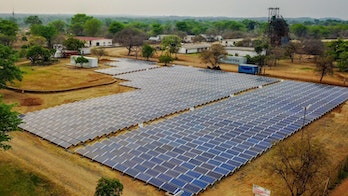Climate Change
Energy sector is central to efforts to combat climate change
Promoting sustainable development and combating climate change have become intertwined aspects of energy planning, analysis and policy making. Energy accounts for two-thirds of total greenhouse gas, so the energy sector is the central player in efforts to reduce emissions and mitigate climate change.
Key findings
Fossil fuel demand in the Stated Policies Scenario, 1900-2050
OpenFor the first time, global demand for each of the fossil fuels will peak or plateau in a WEO scenario
Despite the temporary upside from today's energy crisis, renewables, supported by nuclear power, see sustained gains. Total demand for fossil fuels declines steadily from the mid-2020s by around 2 exajoules per year on average to 2050, an annual reduction roughly equivalent to the lifetime output of a large oil field. Full achievement of all climate pledges would move the world towards safer ground, but there is still a large gap between today’s ambitions and a 1.5 °C stabilisation.
By 2030 in the STEPS, this share falls below 75%, and to just above 60% by 2050. A high point for global energy-related CO2 emissions is reached in the STEPS in 2025, at 37 billion tonnes (Gt) per year, and they fall back to 32 Gt by 2050. This would be associated with a rise of around 2.5 °C in global average temperatures by 2100. This is a better outcome than projected a few years ago: renewed policy momentum and technology gains made since 2015 have shaved around 1 °C off the long-term temperature rise.
By 2030 in the STEPS, this share falls below 75%, and to just above 60% by 2050. A high point for global energy-related CO2 emissions is reached in the STEPS in 2025, at 37 billion tonnes (Gt) per year, and they fall back to 32 Gt by 2050. This would be associated with a rise of around 2.5 °C in global average temperatures by 2100. This is a better outcome than projected a few years ago: renewed policy momentum and technology gains made since 2015 have shaved around 1 °C off the long-term temperature rise.
Global CO2 emissions by sector, 2019
OpenPower generation is the largest emissions driver
Power generation and transport together accounted for over two thirds of total emissions in 2019 and have been responsible for almost all global growth since 2010. The remaining third was mainly associated with the industry and buildings sectors.
After allocating electricity and heat emissions to final sectors, industry continued to be the largest emitting sector, with over 40% of global emissions in 2019. Emissions in the transport sector increased to account for 27% of the global emissions in 2019, while buildings related emissions slightly decreased to represent 25% of global emissions in 2019.
After allocating electricity and heat emissions to final sectors, industry continued to be the largest emitting sector, with over 40% of global emissions in 2019. Emissions in the transport sector increased to account for 27% of the global emissions in 2019, while buildings related emissions slightly decreased to represent 25% of global emissions in 2019.
Featured analysis
Analysis
-

Net Zero Roadmap: A Global Pathway to Keep the 1.5 °C Goal in Reach
2023 Update
-
Breakthrough Agenda Report 2023

-
Financing Clean Energy in Africa
World Energy Outlook Special Report

-
Implementing Clean Energy Transitions
Focus on road transport in emerging economies

-
We can’t defeat climate change by investing in a handful of countries. The world needs to come together at COP28 – and fund a just energy transition
-
Climate Resilience for Energy Transition in Morocco
-
Climate Resilience for Energy Transition in Oman
-
Climate Resilience for Energy Transition in Egypt


